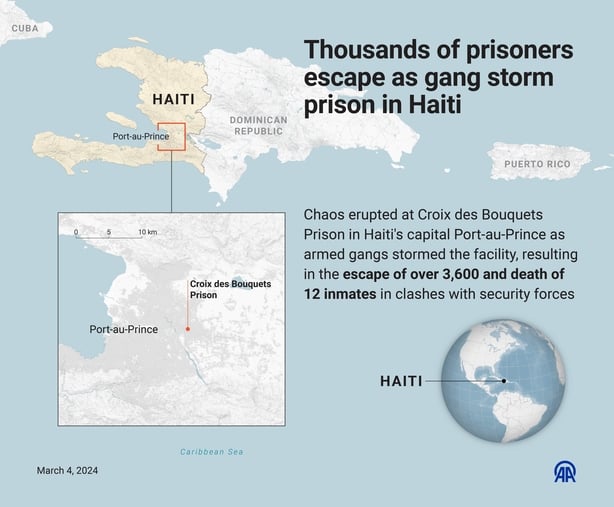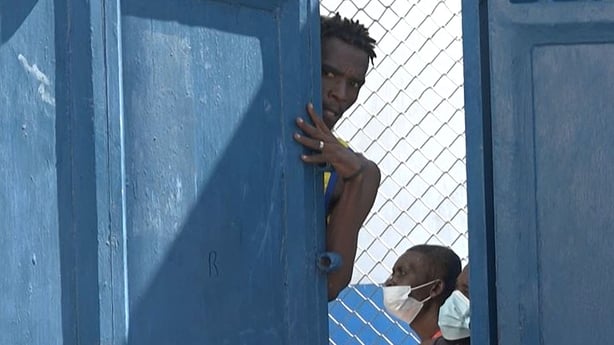The United States has called for its citizens to leave Haiti "as soon as possible" after violence escalated over the weekend, which saw 15,000 more people flee the fighting and armed men break thousands of inmates from Haiti's largest prison.
The United States, which is home to over a million Haitians, said its embassy would be offering limited operations today while Canada said it would temporarily close its embassy.
It comes after Haiti's government declared a state of emergency yesterday evening after violent clashes in the capital damaged communications and led to a prison escape as the leader of a major gang alliance sought to oust the prime minister.
Prime Minister Ariel Henry, who is unelected and came to power after the country's last president was killed, had recently travelled to Kenya to seal a deal for Kenyan forces to lead a planned UN-ratified mission to battle Haiti's gangs.
Between Thursday and Saturday last week, the United Nations estimated close to 15,000 people were forced to flee, including those already in makeshift camps for displaced people set up in schools, hospitals and squares around the capital.
The UN estimated earlier this year over 300,000 had fled their homes due to the worsening gang conflict, which saw close to 5,000 killed last year.
The government declared nighttime curfew in a bid to regain control of the country after the deadly gang assault on the capital's main prison.
The curfew will be enforced from 6pm to 5am in the Ouest region, which includes the capital, until Wednesday, the government said in a statement, adding that both the curfew and the state of emergency can be extended.
About a dozen people died as gang members attacked the National Penitentiary in Port-au-Prince overnight Saturday into yesterday, an AFP reporter observed.
The gangs say they want to oust Prime Minister Henry.
Only around 100 of the National Penitentiary's estimated 3,800 inmates were still inside the facility yesterday after the gang assault, Pierre Esperance of the National Network for Defense of Human Rights said.
A reporter who visited the prison yesterday observed around a dozen bodies outside it and hardly anyone inside. Some bodies had wounds from bullets or other projectiles.

In its statement late yesterday, the Haitian government said security forces had "received orders to use all legal means at their disposal to enforce the curfew and detain those who violate it."
It said the objective was to allow the government to "re-establish order and take the appropriate measures to take back control of the situation."
Economy Minister Patrick Michel Boisvert signed the statement as the country's acting prime minister.
Haiti's government is notoriously weak - kidnapping and other violent crime is rampant and gangs are described as much better armed than the police themselves.
Gang members also attacked a second prison called Croix des Bouquets, police said earlier.
Known gang leaders and people charged in the assassination of Moise were among those incarcerated in the main prison, located a few hundred meters from the National Palace, the Haitian daily Le Nouvelliste said.
The prison had been "spied on by the assailants since Thursday via drones," before it was attacked early Saturday evening, according to Le Nouvelliste.
Mr Esperance said it was not immediately clear how many inmates escaped from the second prison, which he said held 1,450 inmates.

Kenya-led security mission
Powerful gang leader Jimmy Cherisier, known by the nickname Barbecue, said in a video posted on social media that armed groups in Haiti were acting in concert "to get Prime Minister Ariel Henry to step down."
It was not immediately clear yesterday if the prime minister had returned to Haiti after his Kenya trip.
On Friday, Mr Henry signed an accord in Nairobi with Kenyan President William Ruto on deploying the force.
Mr Ruto said he and Mr Henry had "discussed the next steps to enable the fast-tracking of the deployment," but it was not immediately clear whether the agreement would counter a court ruling in January that branded the deployment "illegal."
Haiti, the Western hemisphere's poorest nation, has been in turmoil for years, and the 2021 presidential assassination plunged the country further into chaos.
No elections have taken place since 2016 and the presidency remains vacant.
Protesters have demanded Mr Henry's resignation in line with a political deal that required Haiti to hold polls and for him to cede power to newly elected officials by 7 February this year.

